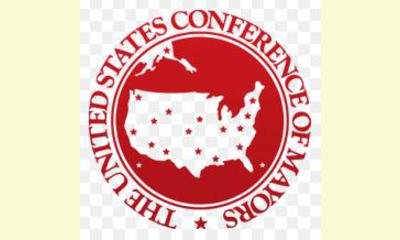|
|
The U.S. Has a Representative Government: The Conference of Mayors
un articulo por David Swanson (abridged)
Congress can't break 10 percent approval. Obama's arms shipments to Syria just crack 10 percent, with 11 percent approval. Over 80 percent of Americans in more polls than I can count say over and over again that the government is broken and does not represent us. But when the mayors of the cities of the United States get together nationally one begins to see positions taken, at least rhetorically, that resemble government of, by, or for the people.

click on photo to enlarge
On Monday the U.S. Conference of Mayors unanimously adopted a resolution "CALLING FOR U.S. LEADERSHIP IN GLOBAL ELIMINATION OF NUCLEAR WEAPONS AND REDIRECTION OF MILITARY SPENDING TO DOMESTIC NEEDS."
Cities can follow the leads of their mayors and pass similar resolutions. A bill in Congress (HR 1650) at least partially meets the proposals in the resolution, and cities could ask their representatives in the U.S. House to sign onto it. The state of Connecticut this month created a commission to work for the conversion of Connecticut's economy away from militarism and toward peaceful manufacturing jobs. Cities could create such commissions or urge their states to do so. It would be good to see such steps follow from Monday's admirable rhetoric. The resolution, as passed, included this:
"BE IT FURTHER RESOLVED, that the U.S. Conference of Mayors calls on the President and Congress to reduce funding for modernization of nuclear weapons systems, to reduce nuclear weapons spending to the minimum necessary to assure the safety and security of the existing weapons as they await disablement and dismantlement, and redirect those funds to meet the urgent needs of cities; and
"BE IT FURTHER RESOLVED, that the U.S. Conference of Mayors calls on the President and Congress to reduce military spending and to reinvest those funds in programs to address the dramatic increase in poverty and inequality in our country; take emergency measures to repair the social safety net and protect Social Security and Medicare; create jobs, retrain displaced workers, including military contractors, rebuild deteriorating physical infrastructure, invest in new technologies for a sustainable energy future, and aid local government to restore and maintain vital public services, reemploying teachers, police, firefighters and other workers."
The bill passed this month by the Connecticut legislature and signed by the Governor creates a commission to develop a plan for, among other things:
"the diversification or conversion of defense-related industries with an emphasis on encouraging environmentally-sustainable and civilian product manufacturing . . .
Read the full text, including the make-up of the commission, which is to include labor union and peace movement representatives. Imagine Congress creating something like that!
|








|
DISCUSSION
Pregunta(s) relacionada(s) al artículo :
The peace movement in the United States, What are its strengths and weaknesses?
* * * * *
Comentario más reciente:
CPNN has received the following story illustrating strengths of the US Peace Movement as it attempts to block an American war with Iran:
********************************
Anti-War Movement Successfully Pushes Back Against Military Confrontation With Iran
By Mark Weisbrot, AlterNet
Who says there's no anti-war movement in the United States? In the past two months, the anti-war movement has taken on one of the most powerful lobbying groups in the United States in an important fight. And so far, the anti-war movement is winning.
Here's the story: On May 22, a bill was introduced into Congress that effectively called for a blockade of Iran, H. Con. Res. 362. Among other expressions of hostility, the bill calls for: "prohibiting the export to Iran of all refined petroleum products; imposing stringent inspection requirements on all persons, vehicles, ships, planes, trains, and cargo entering or departing Iran ... " This sounded an awful lot like it was calling for a blockade, which is an act of war. A dangerous proposition, especially given all the efforts that the Bush-Cheney administration has taken to move us closer to a military confrontation with Iran, the bluster and the threats, and the refusal to engage in direct talks with the Iranian government. . ... continuación.

|
|









